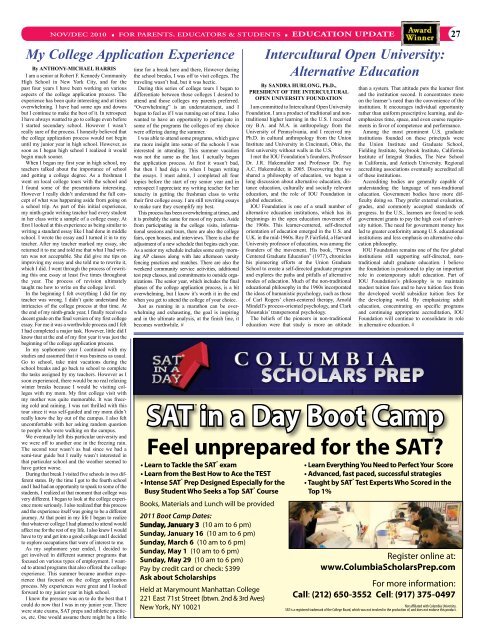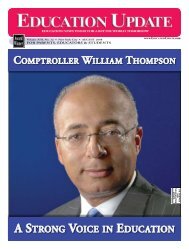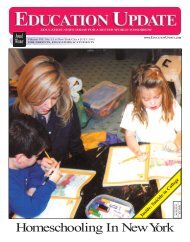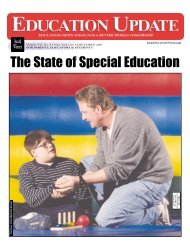Download PDF - Education Update
Download PDF - Education Update
Download PDF - Education Update
Create successful ePaper yourself
Turn your PDF publications into a flip-book with our unique Google optimized e-Paper software.
NOV/DEC 2010 ■ For Parents, Educators & Students ■ <strong>Education</strong> updateMy College Application ExperienceBy Anthony-Michael HarrisI am a senior at Robert F. Kennedy CommunityHigh School in New York City, and for thepast four years I have been working on variousaspects of the college application process. Theexperience has been quite interesting and at timesoverwhelming. I have had some ups and downsbut I continue to make the best of it. In retrospectI have always wanted to go to college even beforeI started secondary school. However I wasn’treally sure of the process. I honestly believed thatthe college application process would not beginuntil my junior year in high school. However, assoon as I began high school I realized it wouldbegin much sooner.When I began my first year in high school, myteachers talked about the importance of schooland getting a college degree. As a freshman Iwent on local college tours with the school andI found some of the presentations interesting.However I really didn’t understand the full conceptof what was happening aside from going ona school trip. As part of this initial experience,my ninth-grade writing teacher had every studentin her class write a sample of a college essay. Atfirst I looked at this experience as being similar towriting a standard essay like I had done in middleschool. I wrote the essay and I turned it in to myteacher. After my teacher marked my essay, shereturned it to me and told me that what I had writtenwas not acceptable. She did give me tips onimproving my essay and she told me to rewrite it,which I did. I went through the process of rewritingthis one essay at least five times throughoutthe year. The process of revision ultimatelytaught me how to write on the college level.In the beginning I felt everything I did for myteacher was wrong. I didn’t quite understand theintricacies of the college process at that time. Atthe end of my ninth-grade year, I finally received adecent grade on the final version of my first collegeessay. For me it was a worthwhile process and I feltI had completed a major task. However, little did Iknow that at the end of my first year it was just thebeginning of the college application process.In my sophomore year I continued with mystudies and assumed that it was business as usual.Go to school, take mini vacations during theschool breaks and go back to school to completethe tasks assigned by my teachers. However as Isoon experienced, there would be no real relaxingwinter breaks because I would be visiting collegeswith my mom. My first college visit withmy mother was quite memorable. It was freezingcold and raining. I was not thrilled with thistour since it was self-guided and my mom didn’treally know the lay out of the campus. I also feltuncomfortable with her asking random questionto people who were walking on the campus.We eventually left this particular university andwe were off to another one in the freezing rain.The second tour wasn’t as bad since we had asemi-tour guide but I really wasn’t interested inthat particular school and the weather seemed tohave gotten worse.During that break I visited five schools in two differentstates. By the time I got to the fourth schooland I had had an opportunity to speak to some of thestudents, I realized at that moment that college wasvery different. I began to look at the college experiencemore seriously. I also realized that this processand the experience itself was going to be a differentjourney. At that point in my life I began to realizethat whatever college I had planned to attend wouldaffect me for the rest of my life. I also knew I wouldhave to try and get into a good college and I decidedto explore occupations that were of interest to me.As my sophomore year ended, I decided toget involved in different summer programs thatfocused on various types of employment. I wantedto attend programs that also offered the collegeexperience. This summer became another experiencethat focused on the college applicationprocess. My experiences were great and I lookedforward to my junior year in high school.I knew the pressure was on to do the best that Icould do now that I was in my junior year. Therewere state exams, SAT preps and athletic practices,etc. One would assume there might be a littletime for a break here and there, However duringthe school breaks, I was off to visit colleges. Thetraveling wasn’t bad, but it was hectic.During this series of college tours I began todifferentiate between those colleges I desired toattend and those colleges my parents preferred.“Overwhelming” is an understatement, and Ibegan to feel as if I was running out of time. I alsowanted to have an opportunity to participate insome of the programs the colleges of my choicewere offering during the summer.I was able to attend some programs, which gaveme more insight into some of the schools I wasinterested in attending. This summer vacationwas not the same as the last. I actually beganthe application process. At first it wasn’t bad,but then I had deja vu when I began writingthe essays. I must admit, I completed all fourtopics before the start of my senior year and inretrospect I appreciate my writing teacher for hertenacity in getting the freshman class to writetheir first college essay. I am still rewriting essaysto make sure they exemplify my best.This process has been overwhelming at times, andit is probably the same for most of my peers. Asidefrom participating in the college visits, informationalsessions and tours, there are also the collegefairs, open houses, and interviews. There is also theadjustment of a new schedule that begins each year.As a senior my schedule includes some early morningAP classes along with late afternoon varsityfencing practices and matches. There are also theweekend community service activities, additionaltest prep classes, and commitments to outside organizations.The senior year, which includes the finalphases of the college application process, is a bitoverwhelming, but I know it’s worth it in the endwhen you get to attend the college of your choice.Just as running in a marathon can be overwhelmingand exhausting, the goal is inspiringand in the ultimate analysis, at the finish line, itbecomes worthwhile. #®®SAT®in a Day Boot CampFeel unprepared for the SAT?®• Learn • Learn to Tackle to Tackle the SAT the ® exam SAT ® exam• Learn from the Best How to Ace the TEST• Intense • Learn SAT from ® Prep the Designed Best How Especially to for theBusy Ace Student the TEST Who Seeks a Top SAT ® CourseBooks, • Intense Materials SAT and ® Prep Lunch Designed will be provided2011 Especially Boot Camp for Dates: the Busy StudentSunday, Who January Seeks a 3 Top (10 am SAT to ® Course 6 pm)Sunday, January 16 (10 am to 6 pm)Sunday, Books, March Materials 6 (10 and am Lunch to 6 pm)Sunday,will beMayprovided1 (10 am to 6 pm)Sunday, May 29 (10 am to 6 pm)Pay 2011 by credit Boot card Camp or Dates: check: $399AskSunday,about ScholarshipsJanuary 3 (10 am to 6 pm)Held Sunday, at Marymount January Manhattan 16 (10 am College to 6 pm)221 Sunday, East 71st March Street 6 (btwn. (10 2nd am & to 3rd 6 pm) Aves)New Sunday, York, NY May 10021 1 (10 am to 6 pm)Sunday, May 29 (10 am to 6 pm)Intercultural Open University:Alternative <strong>Education</strong>By Sandra Hurlong, Ph.D.,President of the InterculturalOpen University FoundationI am committed to Intercultural Open UniversityFoundation. I am a product of traditional and nontraditionalhigher learning in the U.S. I receivedmy B.A. and M.A. in anthropology from theUniversity of Pennsylvania, and I received myPh.D. in cultural anthropology from the UnionInstitute and University in Cincinnati, Ohio, thefirst university without walls in the U.S.I met the IOU Foundation’s founders, ProfessorDr. J.R. Hakemulder and Professor Dr. FayA.C. Hakemulder, in 2005. Discovering that weshared a philosophy of education, we began along discussion about alternative education, distanceeducation, culturally and socially relevanteducation, and the role of IOU Foundation inglobal education.IOU Foundation is one of a small number ofalternative education institutions, which has itsbeginnings in the open education movement ofthe 1960s. This learner-centered, self-directedorientation of education emerged in the U.S. andU.K. in the mid-1960s. Roy P. Fairfield, a HarvardUniversity professor of education, was among thefounders of the movement. His book, “PersonCentered Graduate <strong>Education</strong>” (1977), chronicleshis pioneering efforts at the Union GraduateSchool to create a self-directed graduate programand explores the paths and pitfalls of alternativemodes of education. Much of the non-traditionaleducational philosophy in the 1960s incorporatedthe ideas of humanistic psychology, such as thoseof Carl Rogers’ client-centered therapy, ArnoldMindell’s process-oriented psychology, and ClarkMoustakis’ transpersonal psychology.The beliefs of the pioneers in non-traditionaleducation were that study is more an attitude• Learn Everything You Need to Perfect Your Score• Learn Everything You Need to Perfect•YourAdvanced,Scorefast paced, successful strategies• Advanced, Top 1% fast paced, successfulstrategies• Taught by SAT ® Test Experts WhoScored in the Top 1%• Taught by SAT ® Test Experts Who Scored in thePay by credit card or check: $399Ask about ScholarshipsHeld atMarymount Manhattan College221 East 71st Street(between 2nd & 3rd Avenues)New York, NY 10021Not affiliated with Columbia University.SAT is a registered trademark of the College Board, which was not involved in the production of, and does not endorse this product.For more information:27than a system. That attitude puts the learner firstand the institution second. It concentrates moreon the learner’s need than the convenience of theinstitution. It encourages individual opportunityrather than uniform prescriptive learning, and deemphasizestime, space, and even course requirementsin favor of competence and performance.Among the most prominent U.S. graduateinstitutions founded on these principals werethe Union Institute and Graduate School,Fielding Institute, Saybrook Institute, CaliforniaInstitute of Integral Studies, The New Schoolin California, and Antioch University. Regionalaccrediting associations eventually accredited allof these institutions.Accrediting bodies are generally capable ofunderstanding the language of non-traditionaleducation. Government bodies have more difficultydoing so. They prefer external evaluation,grades, and commonly accepted standards ofprogress. In the U.S., learners are forced to seekgovernment grants to pay the high cost of universitytuition. The need for government money hasled to greater conformity among U.S. educationalinstitutions and less emphasis on alternative educationphilosophy.IOU Foundation remains one of the few globalinstitutions still supporting self-directed, nontraditionaladult graduate education. I believethe foundation is positioned to play an importantrole in contemporary adult education. Part ofIOU Foundation’s philosophy is to maintainmodest tuition fees and to have tuition fees fromthe developed world subsidize tuition fees forthe developing world. By emphasizing adulteducation, concentrating on specific programsand continuing appropriate accreditation, IOUFoundation will continue to consolidate its rolein alternative education. #Register online at:www.ColumbiaScholarsPrep.comFor more information:Call: (212) 650-3552 Cell: (917) 375-0497
















